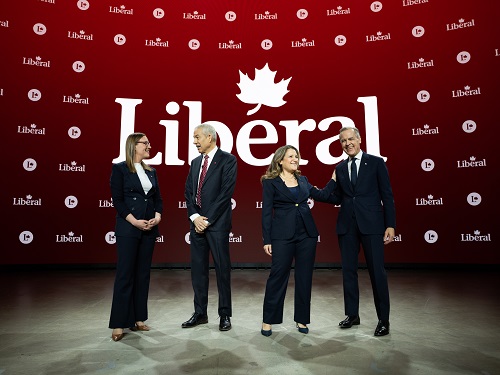The “TRU-effect”: Carney’s Liberals would have more support than Poilievre’s Conservatives
TORONTO – If it weren’t for the fact that two polls “say” it, one might think that there must be a mistakes somewhere. But two research institutes have revealed that, today, with Mark Carney as leader, the Liberals would overtake the Conservatives in the federal elections. For the first time in years, therefore, the public’s approval of the two main Canadian parties changes radically.
The first survey is by Léger Marketing, and it appeared today on CityNews: according to the survey, first of all, if federal elections were held today, 38% of Canadians would vote for the Conservative Party, while 35% would vote for the Liberal Party; the Liberals gain two points compared to a previous poll last week (33%), while the Conservatives decrease by three points (41%). Already here, we can see a reversal of trend compared to what we have seen in recent months. But the most interesting part comes now: with Mark Carney as leader, Liberal support would rise to 40% (+5), while Conservative support would remain at 38%. Therefore, if Marc Carney were the leader of the Liberal Party, he would overtake the Conservatives and lead in voting intentions.
The reasons? Two, at least. The two “TRUs”.
The first is certainly the TRUmp-effect: in Canada, nobody likes the continuous announcements of the American president in an anti-Canadian key and this has certainly penalized the leader of the Canadian Conservatives, since Donald Trump belongs to the same political-ideological area. The second is the TRUdeau-effect: his gradual exit from the scene had positive consequences on the Liberal Party whose approval rating, with him as leader, was reduced to the bare minimum: a Léger poll in December, for example, placed the Conservatives at 43% compared to 21% for Justin Trudeau’s Liberals. Everything has changed, evidently, since Trudeau announced he would step down as party leader, and also as prime minister once the Liberals elected a new leader. And, apparently, Carney is considered an excellent new leader.
Léger’s new poll – conducted on a sample of 1,534 adult Canadians between February 21 and 23 – also found data from other parties in a scenario with Carney as Liberal leader: 11% for the NDP, 5% for the Bloc Québécois, 3% for the Greens and 2% for the People’s Party of Canada (you can read/download the whole survey here).
The Léger’s data have, as we said at the beginning, a sort of “proof” in another equally authoritative survey: the one by Ipsos Public Affairs, conducted exclusively for Global News and published today. The research shows that if a federal election were held tomorrow, the Liberals would get 38% of voters’ firm support compared to 36% for the Conservatives, reversing what was a clear Conservative advantage until a few weeks ago. In fact, Ipsos polls at the beginning of February showed that Pierre Poilievre’s Conservatives had 41% support among determined voters, while the Liberals stood at 28%. According to the new poll, conducted between February 21 and 24 among a sample of 1,000 voting-age Canadians, the Liberals have thus increased their numbers by as much as 10 points compared to the last Ipsos poll published earlier this month (read/download here a synthesis of the new poll; the links to the whole survey are here).
The results of these two polls echo numerous other recent polls indicating that the Liberals are closing the gap with the Conservatives in the seven weeks since Prime Minister Justin Trudeau announced his resignation and as the country prepares for the harmful US tariffs that come into force next week and that one Conservative, Donald Trump, has decided to impose. What we could define as the “TRU-effect” (Trudeau-Trump) therefore also seems to influence the result of the Ipsos poll, with the Conservatives down by five points, the Liberals without Trudeau up by ten and drops for the NDP and the Bloc Quebecois, down respectively – again according to the Ipsos poll – to 12% and 6%. “The Liberal leadership is changing, Justin Trudeau is gone and there will be a new leader of the Liberal Party and I think people are interested to see who that will be,” Darrell Bricker, CEO of Ipsos Public Affairs, told Global News. And if it were Carney, former governor of the Bank of England and the Bank of Canada, a game that seemed closed could really be reopened.
In the pic above, the four candidates for the Liberal leadership. From left: Karina Gould, Frank Baylis, Chrystia Freeland and Mark Carney (from Twitter X – @liberal_party)



